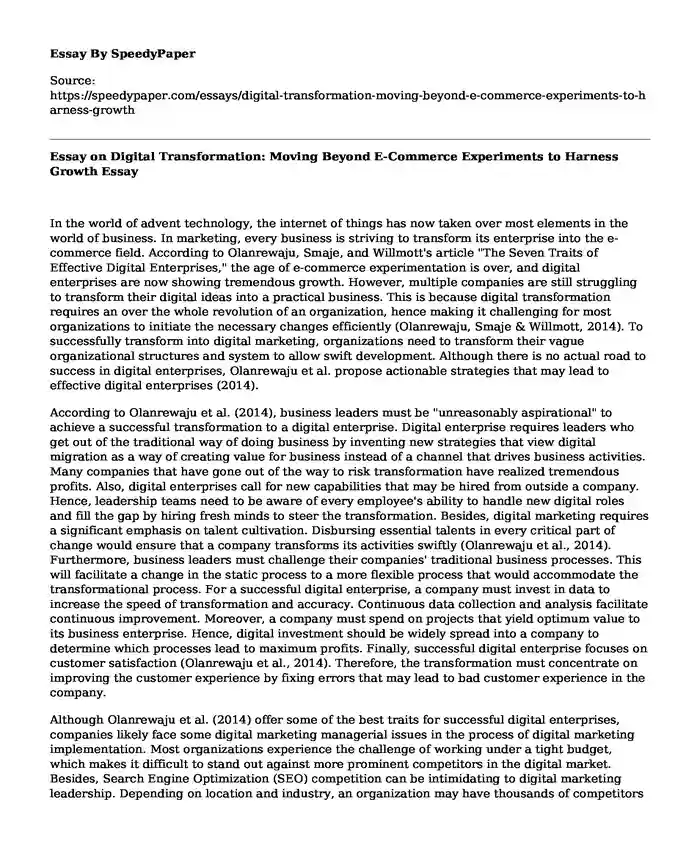
| Type of paper: | Essay |
| Categories: | Business Internet Technology |
| Pages: | 3 |
| Wordcount: | 589 words |
In the world of advent technology, the internet of things has now taken over most elements in the world of business. In marketing, every business is striving to transform its enterprise into the e-commerce field. According to Olanrewaju, Smaje, and Willmott's article "The Seven Traits of Effective Digital Enterprises," the age of e-commerce experimentation is over, and digital enterprises are now showing tremendous growth. However, multiple companies are still struggling to transform their digital ideas into a practical business. This is because digital transformation requires an over the whole revolution of an organization, hence making it challenging for most organizations to initiate the necessary changes efficiently (Olanrewaju, Smaje & Willmott, 2014). To successfully transform into digital marketing, organizations need to transform their vague organizational structures and system to allow swift development. Although there is no actual road to success in digital enterprises, Olanrewaju et al. propose actionable strategies that may lead to effective digital enterprises (2014).
According to Olanrewaju et al. (2014), business leaders must be "unreasonably aspirational" to achieve a successful transformation to a digital enterprise. Digital enterprise requires leaders who get out of the traditional way of doing business by inventing new strategies that view digital migration as a way of creating value for business instead of a channel that drives business activities. Many companies that have gone out of the way to risk transformation have realized tremendous profits. Also, digital enterprises call for new capabilities that may be hired from outside a company. Hence, leadership teams need to be aware of every employee's ability to handle new digital roles and fill the gap by hiring fresh minds to steer the transformation. Besides, digital marketing requires a significant emphasis on talent cultivation. Disbursing essential talents in every critical part of change would ensure that a company transforms its activities swiftly (Olanrewaju et al., 2014). Furthermore, business leaders must challenge their companies' traditional business processes. This will facilitate a change in the static process to a more flexible process that would accommodate the transformational process. For a successful digital enterprise, a company must invest in data to increase the speed of transformation and accuracy. Continuous data collection and analysis facilitate continuous improvement. Moreover, a company must spend on projects that yield optimum value to its business enterprise. Hence, digital investment should be widely spread into a company to determine which processes lead to maximum profits. Finally, successful digital enterprise focuses on customer satisfaction (Olanrewaju et al., 2014). Therefore, the transformation must concentrate on improving the customer experience by fixing errors that may lead to bad customer experience in the company.
Although Olanrewaju et al. (2014) offer some of the best traits for successful digital enterprises, companies likely face some digital marketing managerial issues in the process of digital marketing implementation. Most organizations experience the challenge of working under a tight budget, which makes it difficult to stand out against more prominent competitors in the digital market. Besides, Search Engine Optimization (SEO) competition can be intimidating to digital marketing leadership. Depending on location and industry, an organization may have thousands of competitors striving to achieve the same position in the digital market. Hence, trying to move beyond the odds and win the stiff competition may be overwhelming. Digital enterprises depend highly on social media platforms due to their efficiency of use and free engagement with customers. However, approaching social media with the required sophistication is a significant managerial issue.
References
Olanrewaju, T., Smaje, K., & Willmott, P. (2014). The seven traits of effective digital enterprises. Mode of access: https://www. mckinsey. com/business-functions/organization/our.
Cite this page
Essay on Digital Transformation: Moving Beyond E-Commerce Experiments to Harness Growth. (2023, Oct 29). Retrieved from https://speedypaper.com/essays/digital-transformation-moving-beyond-e-commerce-experiments-to-harness-growth
Request Removal
If you are the original author of this essay and no longer wish to have it published on the SpeedyPaper website, please click below to request its removal:
- Research Proposal Paper Sample: Implementation Plan for Evidence-Based Practice
- Essay Sample on Developing of the Quick App Marketing App
- What the Survey Will Reveal. Paper Sample
- Regulating Facebook Dominance. Paper Example
- ILAC Hypotheticals Brad, Elena, and Jack. Free Essay
- Free Essay Sample on The Organization and Its Human Resource Management Processes
- Essay Sample on Online Business
Popular categories




